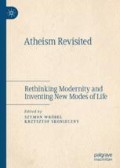Abstract
In the Introduction, Wróbel and Skonieczny provide a starting point for the rethinking of atheism, something which is much needed in the current historical moment, characterized as it is by the conflicting forces of secularization and the “return of religion”. As a starting point for this reconsideration, they formulate three questions: (1) What is atheism, especially in its philosophical form, which has been dubbed the “atheism of the concept”? (2) Are we living in a post-atheistic age and, if so, what does this entail? (3) To what form of atheism should we remain faithful today? The authors then proceed to stress the importance of rethinking Modernity—its main characteristics, main thinkers and remnants—as a starting point for the analysis of atheism, showing also that only through such a rethinking can we invent new modes of (atheist) life. The Introduction also contains short summaries of the chapters gathered in this volume.
Access this chapter
Tax calculation will be finalised at checkout
Purchases are for personal use only
Notes
- 1.
On 10 April 2010, a Polish government aircraft crashed near the city of Smolensk in Russia, killing all 96 passengers and crew. Among the people on the plane were Poland’s president Lech Kaczyński and his wife Maria, along with many other prominent politicians and public figures. Although several investigations ruled the disaster an accident caused by foggy weather and bad decisions, many conspiracy theories were born, citing anything from bombs to artificial fog as the cause of the crash. For some years, politicians close to Kaczyński—mostly from the Law and Justice party—held vigils on the 10th of each month in front of the Presidential Palace to commemorate the crash. Promises of discovering the “true” nature of the disaster and allusions to conspiracy theories, often voiced by top Law and Justice figures, were a common part of these gatherings.
References
Adorno, Theodor W. 1966/1973. Negative Dialectics. Trans. E.B. Ashton. New York: Seabury Press.
Adorno, Theodor W., and Max Horkheimer. 1944/2002. Dialectic of Enlightenment. Trans. Edmund Jephcott. Stanford: Stanford University Press.
Baczko, Bronisław. 1978. Lumières de l’utopie. Paris: Payot.
Baggini, Julian. 2003. Atheism: A Very Short Introduction. Oxford: Oxford University Press.
Barthes, Roland. 1972. Mythologies. Trans. A. Lavers. New York: Farrar, Straus & Giroux.
Benjamin, Walter. 2004. Capitalism as Religion. In Selected Writings Volume I, 1913–1926, ed. Marcus Bullock and Michael W. Jennings, 288–291. Cambridge, MA: Harvard University Press.
Bloch, Ernst. 1918/2000. The Spirit of Utopia. Trans. Anthony Nassar. Stanford: Stanford University Press.
Caputo, John D. 2006. The Weakness of God. Indianapolis: Indiana University Press.
Deleuze, Gilles, and Félix Guattari. 2015. What Is Philosophy? Trans. Hugh Tomlinson and Graham Burchill. London: Verso.
Feuerbach, Ludwig. 1972. The Essence of Christianity. Trans. Zawar Hanfi. New York: Anchor.
Foucault, Michel. 1998. Different Spaces. Trans. Robert Hurley. In Aesthetics, Method, and Epistemology: Essential Works of Foucault, 1954–1984, ed. James D. Faubion, vol. 2, 175–186. New York: The New Press.
Fourier, Charles. 1971. Design for Utopia: Selected Writings. New York: Schocken.
Gramsci, Antonio. 1965/1971. Selections from the Prison Notebooks. Trans. Quintin Hoare and Geoffrey Nowell Smith. New York: International Books.
Hägglund, Martin. 2008. Radical Atheism: Derrida and the Time of Life. Stanford: Stanford University Press.
Haraway, Donna J. 2016. Manifestly Haraway. Minneapolis: University of Minnesota Press.
Kant, Immanuel. 1999. An Answer to the Question: What Is Enlightenment? (1784). In Practical Philosophy, ed. and trans. Mary J. McGregor, 11–22. Cambridge: Cambridge University Press.
Kepel, Gilles. 1994. The Revenge of God: The Resurgence of Islam, Christianity and Judaism in the Modern World. Cambridge: Polity Press.
Kołakowski, Leszek. 1982. Religion. If There Is No God…. New York: Oxford University Press.
Lambert, Gregg. 2016. Return Statements: The Return of Religion in Contemporary Philosophy. Edinburgh: Edinburgh University Press.
Nancy, Jean-Luc. 2008. Dis-enclosure: The Deconstruction of Christianity. Trans. Bettina Bergo et al. New York: Fordham University Press.
Ruse, Michael. 2015. Atheism: What Everyone Needs to Know. Oxford: Oxford University Press.
Spivak, Gayatri Chakravorty. 1999. A Critique of Postcolonial Reason: Toward a History of the Vanishing Present. Cambridge, MA: Harvard University Press.
Author information
Authors and Affiliations
Editor information
Editors and Affiliations
Rights and permissions
Copyright information
© 2020 The Author(s)
About this chapter
Cite this chapter
Wróbel, S., Skonieczny, K. (2020). Introduction to Atheism. In: Wróbel, S., Skonieczny, K. (eds) Atheism Revisited. Palgrave Macmillan, Cham. https://doi.org/10.1007/978-3-030-34368-2_1
Download citation
DOI: https://doi.org/10.1007/978-3-030-34368-2_1
Published:
Publisher Name: Palgrave Macmillan, Cham
Print ISBN: 978-3-030-34367-5
Online ISBN: 978-3-030-34368-2
eBook Packages: Religion and PhilosophyPhilosophy and Religion (R0)

